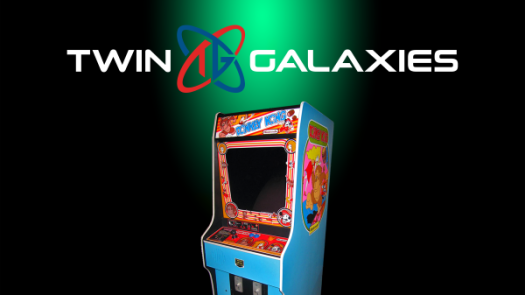Phil Day is the former Galaga Tournament World Record holder (2009 - 2011). He was one of ten Galaga players in the world chosen compete in at the First International Galaga World Championship, Score Wars, Meow Wolf (2018). He is also the Co-Founder and Administrator of Galaga Forum. Day is currently ranked #4 on the Twin Galaxies leaderboard for Galaga Tournament. The following essay was written by and offered with his permission for publication in full on Twin Galaxies Editorial.
In 1989, Stephen Krogman played a game of Galaga on a single quarter for approximately ten hours, resulting in a score of 15,999,990 points. Almost three decades later, no one has surpassed his score in Marathon Galaga. However, I am certain this year it will topple due to a glitch, a renewed interest in marathoning, and point draining.
The Glitch
To better understand the Galaga glitch we'll be talking about, it may be helpful to touch on other similar and notable glitches in retro and arcade gaming. Jon Tannahill, the current Space Invaders World Record holder, owes much of his score to the exploitation of a glitch known as The Wall of Death.

"To get a really high score you have to use a glitch in the programming known as the Wall of Death - or Death Row,” Tannahill explains. “You let the invaders come right down to the very last rank, which is the opposite of what the designers intended. When the invaders have descended to the last rank, they can't hit you. Doing this buys you enough time for more Mystery Ships - worth 300 points apiece - to enter the screen. The most you get from a typical invader is 30 points but the 'glitch' causes the programming to confuse its collision detector. When the Invaders transition from that very last rank, they can run into their own bullets. The collision detector in the programming mistakes this for the player's space cannon so, when this happens, the space canon explodes - even though an enemy invader hasn’t hit it. This is why it's called The Wall of Death. Prior to employing the Wall of Death strategy my scores sat around 7000 points."
The Wall of Death only resurfaced from the 80s when Donald Hayes employed it in 2003 to score a new world record of 55,160 points. Richie Knucklez borrowed the glitch and raised the score to 184,870 points in 2011. Knuckles demonstrated the glitch to Tannahill, which he employed to score 218,870 points earlier this year.
The Wall of Death clearly lifted the score considerably by all three players who employed it. Galaga has no glitch exactly like this but it does have one identical to its precursor, Galaxian, which employs a similar concept.
In 2009, Art Van Vliet found a glitch in Galaxian. He discovered a safe-spot on the screen - a place to ‘park’ the Galaxian ship where enemy fire can't reach - allowing him to take a break from hours of play. Like the rediscovering of the Space Invaders glitch, Van Vliet's discovery of 'parking' has elevated the Galaxian World Record to 2 million points. The highest score dating from the 1980s is less than 400 thousand points. And what’s greater is that Galaga players discovered that they, too, can now park their ship.
Prior to Score Wars and the First International Galaga Championship in 2018, no one had demonstrated the ‘parking’ glitch on any Galaga score for submission. Robert Mruczek, former referee for Twin Galaxies, in all his years of refereeing and witnessing the best classic arcade game tactics, had “never seen anyone park a ship on Galaga. I was completely unaware of any safe-spots until Andrew Barrow performed it at Score Wars."

Barrow demonstrated how to park a ship during a live attempt at Score Wars to beat Krogman's score. Barrow's attempt to pass the 15,999,990 points ended at 10,301,080 points. Resigning from the game due to fatigue, he killed off his five remaining lives.
Nevertheless, his 10.3 million point score is the only recorded game that is worthy of a top-ten slot on the Galaga Marathon leaderboard since the 1980s. He is one of two high-ranking Galaga players ushering in a new era of Galaga marathon play. The other player is Armando Gonzalez - current Galaga Tournament Settings World Record holder and well-accustomed to marathoning Galaga.
Marathoning
For a long time at EightyTwo Arcade, Gonazlez was playing a variation of Galaga known as ‘fast shot’. The game is generally considered much easier than Galaga but what Gonzalez did in September 2017 was a Galaga feat. Playing a single game for almost twelve hours, Gonzalez scored 21 million points. To score so high, Gonzalez had to have rolled all 256 stages seven times. The manufacturers of Galaga never expected anyone to roll the stages once. That said, the manufacturer Namco probably also never expected anyone to be still playing Galaga 37 years after its initial release.
Arcade games manufactured between 1979 and 1980 were not inherently designed to stop players from playing for an extended period time on a single credit. Naturally, video game manufacturers had no reference for how skilled or inventive some players might be or how determined some players might become to hold the ‘high score’ on their favorite games.

The programming on early titles exposes how programmers were unable to foresee the enthusiasm some gamers would have for their creations. An example of this is how quickly the score rolls over on Space Invaders - 10,000 points. And how games like Depth Charge had no difficulty settings. Evidently, programmers couldn’t imagine that any player on a single quarter would last long enough to reach 10,000 points or ever master its difficulty. This would be true for the vast majority of those who played these titles - but not for some.
As expected, arcade operators noticed ‘marathoners’ tying up a game for hours on a single quarter. News of this didn’t take long to reach video game manufacturers learning of ‘marathoners’ exploiting their handiwork. Video game manufacturers, ideally, needed to construct games that wouldn’t be marathonable. Doing so required a balance of game-play and difficulty. It had to be fun and challenging - but not too difficult.
In 1983, Atari released Star Wars. To keep players from marathoning, the game designers decided on a limit of one life protected by six shields. A single shield is lost when hit by enemy fire. When all shields are lost, the game ends. Nevertheless, Atari failed. In 1984, a year after its release, Mruczek marathoned Star Wars for forty-nine hours and thirty minutes on a single credit.

To gain some sort of perspective: A flight from Melbourne airport to Los Angeles is approximately a fourteen-hour flight. Imagine being a passenger on that route three times, back to back, without a full meal or sleep. Now imagine choosing to do it.
Mruczek’s score still stands, just as Krogman’s score still stands. Not because Galaga is so difficult but because the marathon setting on it is that difficult. To that end, Ladybug and Blaster Marathon World Record Holder Dwayne Richard speaks to the mental efforts going into the decision of marathoning a game.
"All classic arcade games have a threshold of difficulty,” Richard explains. “And for most of them, the nature of their intelligence is a lot of repetition - and marathoning that repetition boils down to boredom. It's not fun; it's painful. To do a marathon you have to have a point - and there isn’t really much of a point. It's just something to do. And when you achieve a world record, you’ll wake up the next day and think, 'What’ll I do today?'”
Dwayne Richard touches on an important point. Before marathoning a classic arcade game, the player must have defeated the game in an analytical contest. The player will have learned all the game's patterns - all its nuances and all its secrets - at which point, there are no surprises. The only thing left is to push the score higher and higher. But if there are no sparring partners, then why push at all?
This happened to many of the great players on all the popular tiles from the Golden Age. World Record scores sat unchallenged from the late 80s and through the 90s until they captured the consciousness of players in the 2000s. Many of biggest scores on the greatest titles were improved on, but Marathon Galaga hasn’t been one of them.
Point Draining

No one recalls Randy Davis' 196,900-point score on Donkey Kong of the 1980s, nor should they necessarily - it wasn’t a world record score and was rather far from it. But it is the last remaining score entered onto Twin Galaxies' Donkey Kong leaderboard from that decade. Not a single Donkey Kong score was registered in the 1990s; it had become idle like so many other classic games. Then, in 2000, after fifteen years of nil Donkey Kong activity, Tim Sczerby shocked the Donkey Kong world with a score of 879,200 points, taking the top spot for a time.
In 2005, Steve Wiebe passed Sczerby’s score. In 2005, Billy Mitchell entered back into competition. In 2006, Wiebe took it back again. In 2007, the King of Kong documentary was released, and though Billy Mitchell's scores relating posthumously to the documentary would eventually come under scrutiny, there's no denying that the competition and conversations that spawned of it marked a rather large bullet point in modern arcade gaming. All of sudden, seemingly redundant world records from the 80s were being broken on game after game. But no title equals the attention of Donkey Kong, with the number one position changing hands nineteen times in eleven years. That said, it can’t last.
The Donkey Kong World Record currently sits at 1,247,700 points, thanks to Robbie Lakeman,. There is talk a 1.3 million score is theoretically possible, though it has yet to be proven. Either way, there is a finite score due to the kill screen. Lakeman may push it higher than where it stands now and, if he does, he is pushing Donkey Kong world record attempts a little closer to retirement. Eventually, all available points will be drained. Similar to the Pac-Man perfect score, overcoming previous world records on Donkey Kong will be academic rather than adventurous. Even so, Donkey Kong isn't the only title being drained.
The Dig Dug Tournament second place record holder, Ken House, believes 5.5 million is Dig Dug's limit - the score is already heavily drained at 5,147,610. Tannahill believes there's only another 80,000 points to add to his Space Invaders world record and Joel West is forced to compete against his own scores on Slow-Bullet Random-Play Berzerk – no one seems capable of reaching his scores. It's unlikely Jon ‘The Machine’ McAllister has any interest in bettering his own Asteroids Marathon World Record of 41,338,740 points, requiring 57 hours and 45 minutes of continuous play - and there is no reason for McAllister to better any of the numerous classic arcade world records he currently holds on other titles, including: Cloak & Dagger, Joust, Krull, Robotron, Star Castle, and The End. It’s no wonder he has turned his attention to Galaga - and he’s not alone.
Game On
![Between Andrew Barrow, Armando Gonzalez, and other amazing and active players in the fairly revitalized Galaga scene, there are likely quite a few high-scoring achievements around the corner in the coming years. [Image by TJ Denzer/Twin Galaxies]](https://pkmanager.twingalaxies.com/assets/editorial/2018/05/img-6321.jpg)
All-star retro and arcade players like Dwayne Richard; Nibbler World Champion, Tim McVey; Gorf World Champion, Keith Swanson; and Track & Field World Champion, Héctor Rodriguez have all found a renewed interest in Galaga. Even so, they’re not jumping headlong into the race for the Galaga Marathon world record. Sensible, because that’s not how you eat an elephant … you eat it one spoon at a time.
However, there are four people, who have made it known (to some), that they are preparing to eat the 15,999,990-point elephant. And in case they don’t know it already, its only fair that they do know: Stephen Krogman was unaware of the ‘parking’ glitch until recently. Reportedly, he deliberately ended his game on 15,999,990, killing off his remaining ships. Even so, having only learned of the glitch in the past year, he talked of a 25 million point Galaga score being the feasible limit back in the 80s – Approximately an 18-hour game. With relatively new knowledge in play, if such heights can be reached, competitive Galaga may well have another twenty-nine years ahead of it.
Acknowledgments
Thank you Ken House, Tim McVey, Robert Mruczek, Dwayne Richard, Jon Tannahill, and Joel West for offering their know-how on glitches and marathoning and for their memories of the Golden Age of Video Game competition.






